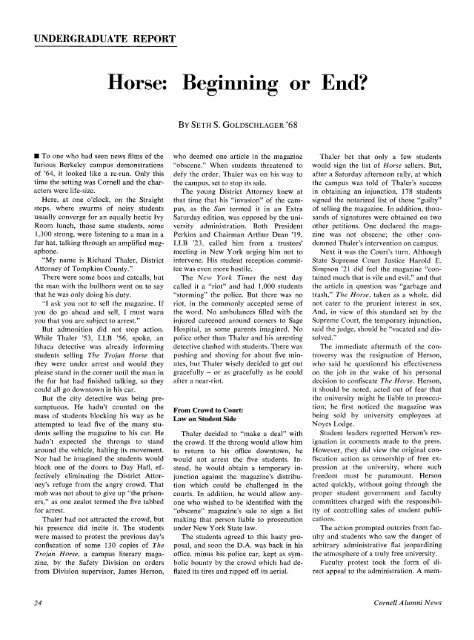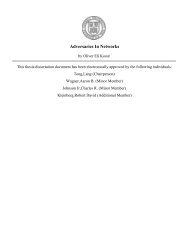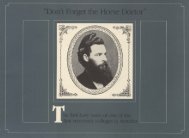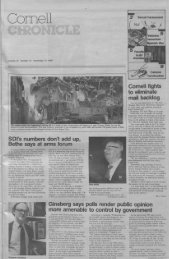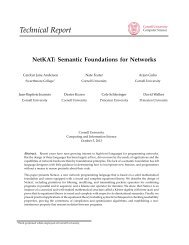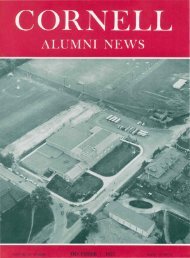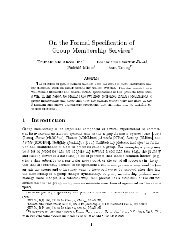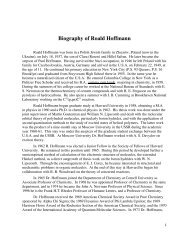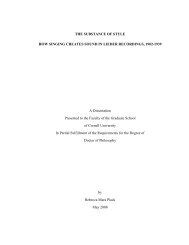Cornell Alumni News - eCommons@Cornell - Cornell University
Cornell Alumni News - eCommons@Cornell - Cornell University
Cornell Alumni News - eCommons@Cornell - Cornell University
You also want an ePaper? Increase the reach of your titles
YUMPU automatically turns print PDFs into web optimized ePapers that Google loves.
UNDERGRADUATE REPORT<br />
• To one who had seen news films of the<br />
furious Berkeley campus demonstrations<br />
of '64, it looked like a re-run. Only this<br />
time the setting was <strong>Cornell</strong> and the characters<br />
were life-size.<br />
Here, at one o'clock, on the Straight<br />
steps, where swarms of noisy students<br />
usually converge for an equally hectic Ivy<br />
Room lunch, those same students, some<br />
1,300 strong, were listening to a man in a<br />
fur hat, talking through an amplified megaphone.<br />
"My name is Richard Thaler, District<br />
Attorney of Tompkins County."<br />
There were some boos and catcalls, but<br />
the man with the bullhorn went on to say<br />
that he was only doing his duty.<br />
"I ask you not to sell the magazine. If<br />
you do go ahead and sell, I must warn<br />
you that you are subject to arrest."<br />
But admonition did not stop action.<br />
While Thaler '53, LLB '56, spoke, an<br />
Ithaca detective was already informing<br />
students selling The Trojan Horse that<br />
they were under arrest and would they<br />
please stand in the corner until the man in<br />
the fur hat had finished talking, so they<br />
could all go downtown in his car.<br />
But the city detective was being presumptuous.<br />
He hadn't counted on the<br />
mass of students blocking his way as he<br />
attempted to lead five of the many students<br />
selling the magazine to his car. He<br />
hadn't expected the throngs to stand<br />
around the vehicle, halting its movement.<br />
Nor had he imagined the students would<br />
block one of the doors to Day Hall, effectively<br />
eliminating the District Attorney's<br />
refuge from the angry crowd. That<br />
mob was not about to give up "the prisoners,"<br />
as one zealot termed the five tabbed<br />
for arrest.<br />
Thaler had not attracted the crowd, but<br />
his presence did incite it. The students<br />
were massed to protest the previous day's<br />
confiscation of some 130 copies of The<br />
Trojan Horse, a campus literary magazine,<br />
by the Safety Division on orders<br />
from Division supervisor, James Herson,<br />
Horse: Beginning or End?<br />
BY SETH S. GOLDSCHLAGER '68<br />
who deemed one article in the magazine<br />
"obscene." When students threatened to<br />
defy the order, Thaler was on his way to<br />
the campus, set to stop its sale.<br />
The young District Attorney knew at<br />
that time that his "invasion" of the campus,<br />
as the Sun termed it in an Extra<br />
Saturday edition, was opposed by the university<br />
administration. Both President<br />
Perkins and Chairman Arthur Dean Ί9,<br />
LLB '23, called him from a trustees'<br />
meeting in New York urging him not to<br />
intervene. His student reception committee<br />
was even more hostile.<br />
The New York Times the next day<br />
called it a "riot" and had 1,000 students<br />
"storming" the police. But there was no<br />
riot, in the commonly accepted sense of<br />
the word. No ambulances filled with the<br />
injured careened around corners to Sage<br />
Hospital, as some parents imagined. No<br />
police other than Thaler and his arresting<br />
detective clashed with students. There was<br />
pushing and shoving for about five minutes,<br />
but Thaler wisely decided to get out<br />
gracefully - or as gracefully as he could<br />
after a near-riot.<br />
From Crowd to Court:<br />
Law on Student Side<br />
Thaler decided to "make a deal" with<br />
the crowd. If the throng would allow him<br />
to return to his office downtown, he<br />
would not arrest the five students. Instead,<br />
he would obtain a temporary injunction<br />
against the magazine's distribution<br />
which could be challenged in the<br />
courts. In addition, he would allow anyone<br />
who wished to be identified with the<br />
"obscene" magazine's sale to sign a list<br />
making that person liable to prosecution<br />
under New York State law.<br />
The students agreed to this hasty proposal,<br />
and soon the D.A. was back in his<br />
office, minus his police car, kept as symbolic<br />
bounty by the crowd which had deflated<br />
its tires and ripped off its aerial.<br />
Thaler bet that only a few students<br />
would sign the list of Horse sellers. But,<br />
after a Saturday afternoon rally, at which<br />
the campus was told of Thaler's success<br />
in obtaining an injunction, 178 students<br />
signed the notarized list of those "guilty"<br />
of selling the magazine. In addition, thousands<br />
of signatures were obtained on two<br />
other petitions. One declared the magazine<br />
was not obscene; the other condemned<br />
Thaler's intervention on campus.<br />
Next it was the Court's turn. Although<br />
State Supreme Court Justice Harold E.<br />
Simpson '21 did feel the magazine "contained<br />
much that is vile and evil," and that<br />
the article in question was "garbage and<br />
trash," The Horse, taken as a whole, did<br />
not cater to the prurient interest in sex.<br />
And, in view of this standard set by the<br />
Supreme Court, the temporary injunction,<br />
said the judge, should be "vacated and dissolved."<br />
The immediate aftermath of the controversy<br />
was the resignation of Herson,<br />
who said he questioned his effectiveness<br />
on the job in the wake of his personal<br />
decision to confiscate The Horse. Herson,<br />
it should be noted, acted out of fear that<br />
the university might be liable to prosecution;<br />
he first noticed the magazine was<br />
being sold by university employees at<br />
Noyes Lodge.<br />
Student leaders regretted Herson's resignation<br />
in comments made to the press.<br />
However, they did view the original confiscation<br />
action as censorship of free expression<br />
at the university, where such<br />
freedom must be paramount. Herson<br />
acted quickly, without going through the<br />
proper student government and faculty<br />
committees charged with the responsibility<br />
of controlling sales of student publications.<br />
The action prompted outcries from faculty<br />
and students who saw the danger of<br />
arbitrary administrative fiat jeopardizing<br />
the atmosphere of a truly free university.<br />
Faculty protest took the form of direct<br />
appeal to the administration. A mem-<br />
24 <strong>Cornell</strong> <strong>Alumni</strong> <strong>News</strong>


